On Saturday 22 June, 60,000 activists walked through London. All ages, all backgrounds, an almost unimaginably broad range of interests and concerns. Even a few years ago we might have seemed disparate, unconnected with each other, but for a glorious, precious few hours we united behind two simple messages: 1) our world is dying, we need more nature - now, and 2) the next government needs to do far, far better than this one. ‘There’s no life without wildlife', ‘More species less faeces’, and frankly the door can’t hit the Tories hard enough on their way out…
It took a long, long time for the huge crowd to make its way down Park Lane and Piccadilly, along Whitehall towards Parliament Square. Hours of drums and whistles, sporadic chanting, and a colorful mile-long crocodile of people. Anti-oil campaigners to anti-hunt activists, bird, butterfly, and badger folk. The Red Rebel Brigade, face-painted children, and elaborate costumes. Small groups with placards about small-scale developments that will smash local wildlife hotspots. Banners the width of the road demanding we all take the climate crisis seriously. Restore Nature Now. Stop treating animals so appallingly. Protest, protest, protest like our lives depended on it. Like the lives of everything depended on it.
Somewhere way up at the front were the organisers and the speakers. Chris Packham, who somehow pulled this event off, a naturalist who has spent his entire adult life working towards bringing us all together like this. Emma Thompson, who spoke about political inaction on climate change, a ‘national treasure’ risking the wrath of fossil fuel lobbyists from the right-wing media. Feargal Sharkey (image below), the most effective - and if you’re of a certain age perhaps the most unexpected - campaigner against the rapaciousness of the privatised UK water industry. Dale Vince, the Ecotricity founder, a vegan who reminded us all that the biodiversity crisis has its deep roots in the food choices we all make. Sarah Finch, whose recent climate change legal challenge against Surrey County Council could prove pivotal in the fight against new oil licences. Nemonte Nenquimo, 2020 Goldman Prize Winner and member of the Waorani nation from the Amazonian region of Ecuador.
So many voices from young to old, from the famous to the less well-known (for now anyway). Impassioned activists talking to impassioned activists. No admonishment. Just a repeated plea to make change.
A huge and peaceful protest
This was - despite the seriousness of the message - a universally celebratory, peaceful and friendly march. That’s not meant as a direct comparison with any other march or any other cause, it’s a personal reflection on spending months writing about violent Boxing Day meets. Of seeing the snarling abuse from ‘countryside supporters’ routinely aimed at small protests against hunting and shooting or the badger cull. Of listening to the shocking experiences of monitors and sabs.
This felt inclusive. There was an air of relief as numbers built before it all started: how many? wow, that’s amazing. And trying to find friends, colleagues or supporters became all but impossible - unless (like in the image above) you found each other before the march began. But once that tide began to surge forward, differently paced, walking, stopping, walking again, it didn’t matter. Here we were, experienced and inexperienced, mingling and folding around each other with broad smiles before a pulse to the left or the right meant you found yourself alongside someone else to talk to or share that communal sense of ‘something is happening here’…
Will it make a difference? It has to.
Marches like this always cause the question to be asked: will it make a difference? In February 2003, around a million people marched in London against the looming Iraq war. The war still went ahead and millions died. This year hundreds of thousands of people have marched for an immediate ceasefire in Gaza. The war in Palestine still goes on. Today, 60,000 of us - and some will no doubt have been at those previous protests too - marched for nature. Will it make a difference?
It has to. We are at the crunch point. Right now. The crisis is here.
In February, Georgetown University biologist Colin Carlson calculated that since 2000 climate warming had already killed four million people through malnutrition, floods, diarrhoea, malaria and cardiovascular disease. A recent World Economic Forum report suggests that by 2050 climate change may cause an additional 14.5 million deaths. According to the UNHCR, the UN’s refugee agency, an annual average of 21.5 million people were forcibly displaced each year by weather-related events between 2008 and 2016. ‘Climate migration’ is expected to surge in coming decades with predictions that 1.2 billion people could be displaced globally by 2050 due to climate change and natural disasters.
Around the world we are converting more and more land to feed ourselves, taking grasslands, tidal flats, woodland, and forests from wildlife. The UN Environmental Programme says that soils are turning infertile, water sources are drying up, and that one million species are threatened with extinction. That figure will be a huge underestimation as surveys rarely (if ever) keep up with the pace of decline, most species aren’t evaluated anyway, and in 2011 it was estimated that 86% of land species and 91% of marine species had yet to be identified and described.
Here in the UK we have become one of the most nature-depleted countries on the planet. In April this year, Buglife reported that the abundance of flying insects ‘splatted’ on vehicle number plates had fallen by a staggering 78% since 2004. 26% of mammal species are now at risk of extinction in the UK. The number of wild birds in Britain has fallen by 73 million since 1970. 97% of flower meadows have been destroyed since the 1950s.
That loss doesn’t even consider the almost incomprehensible 78 billion land animals killed every year for humans to eat. More chickens are killed for food than any other land animal: in a single day, 202 million will be slaughtered. For ducks, the number is 12 million, while 3.8 million pigs, 1.7 million sheep, 1.4 million goats, and 900,000 cows are killed every day. No one knows for sure how many fish and crustaceans are pulled from rivers, bays, and oceans every year but it’s billions and billions more.
All these things are linked. Climate change, depletion, war, and exploitation of humans and non-humans alike - all symptoms of a bewildering lack of commonality, of rampant greed and arrogance, of thickheaded political ambition, of a collective failure of imagination, of speciesism and racism and a horribly widespread belief that some humans matter more than others, and all humans matter more than almost all non-humans.
It’s both the journey and the destination that matters
If any of us want to survive (and yes, of course it’s that serious) that mindset - those mindsets - has to change. The London march shows that an increasing number of us - and the organisations that we support and allow to speak for us - ‘get it’. We understand the linkages, see those connections.
That’s why we marched together towards Parliament and the speeches - holding different placards and banners perhaps, but together. Everyone from soil and plant groups to anti-hunt and conservation groups. Normally cautious NGOs with royal patrons walking alongside animal-rights activists and climate protestors who are prepared to risk arrest. Undivided, even if (temporarily hopefully) just temporarily.
It’s easy from the outside to dismiss a march as something ‘of a moment’, but for anyone who’s been in this sector for any length of time, it was clearly much more than that. The Parliament Square destination of course mattered - it was politically symbolic on one level, a vast exhalation of frustration and anger on another. But the journey mattered too. Not the route we all took down Piccadilly and past the Cenotaph, but the one we have all been taking now for decades. It’s been made despite our perceived differences and it has taken us along a track that has seen dots joined, seen us look past the silos, seen many of the barriers that should never have existed between allies removed.
There has been a growing comprehension that if we work for animals, for wildlife, for the climate, whatever we do, no matter how small or how large, we are working for the very same thing: the future of life - all life - on this planet.
What this march demonstrated above all else is that no matter what we focus on, when it comes to the biggest picture of all many of us are at last heading in the same direction.
(All images Protect the Wild. Many thanks to the Protect the Wild supporters who found us and spent the march with us. We appreciated your insight and feedback on our work, and we really enjoyed your company!)
Please consider donating to Protect the Wild if you support what we stand for! We’re working hard to empower people to protect British wildlife and every pound makes a huge difference!




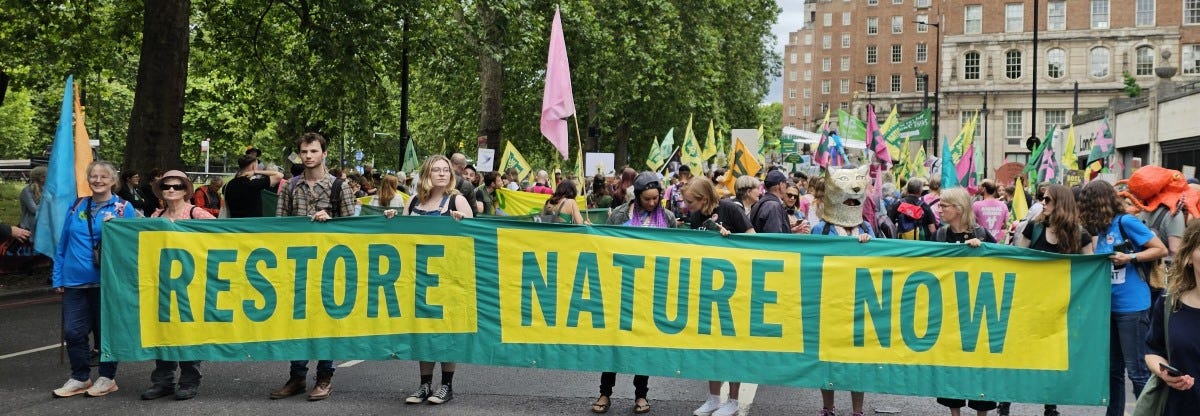
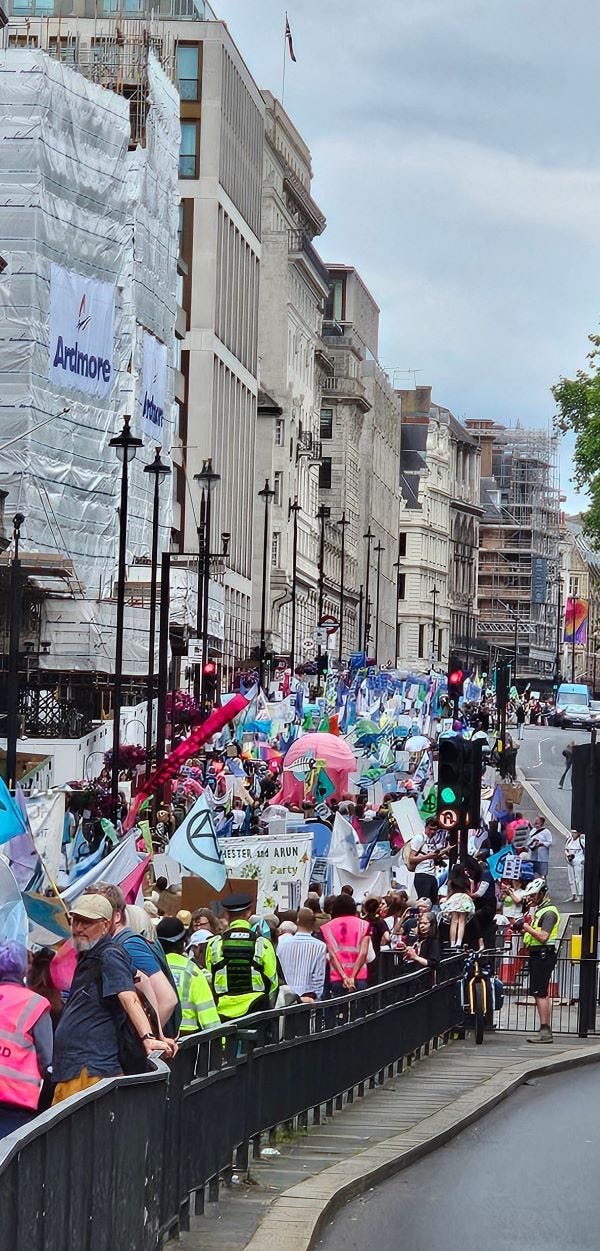
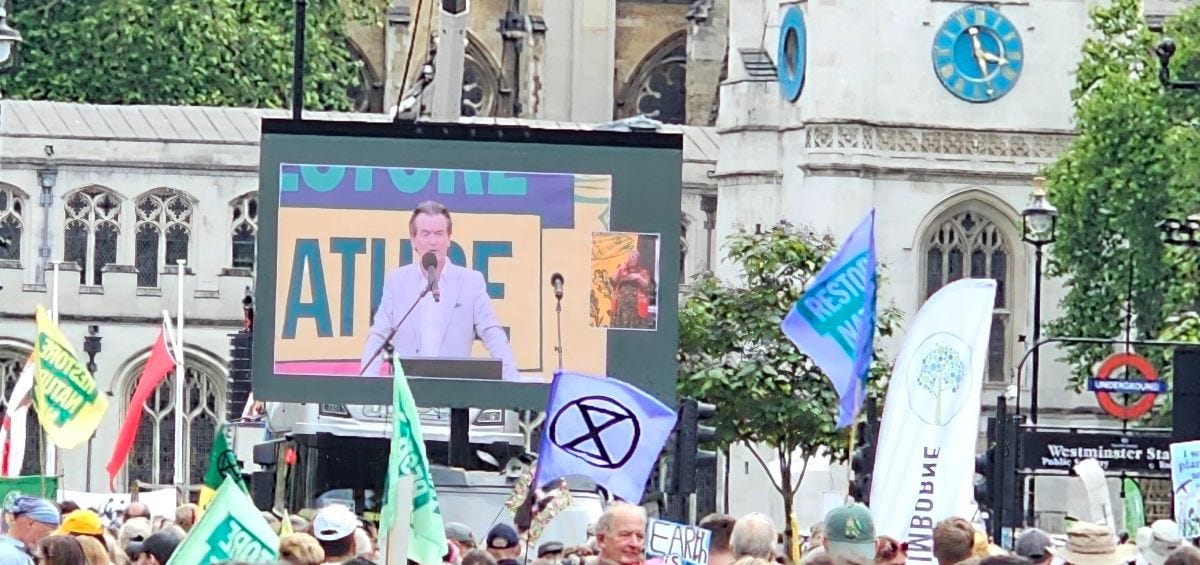
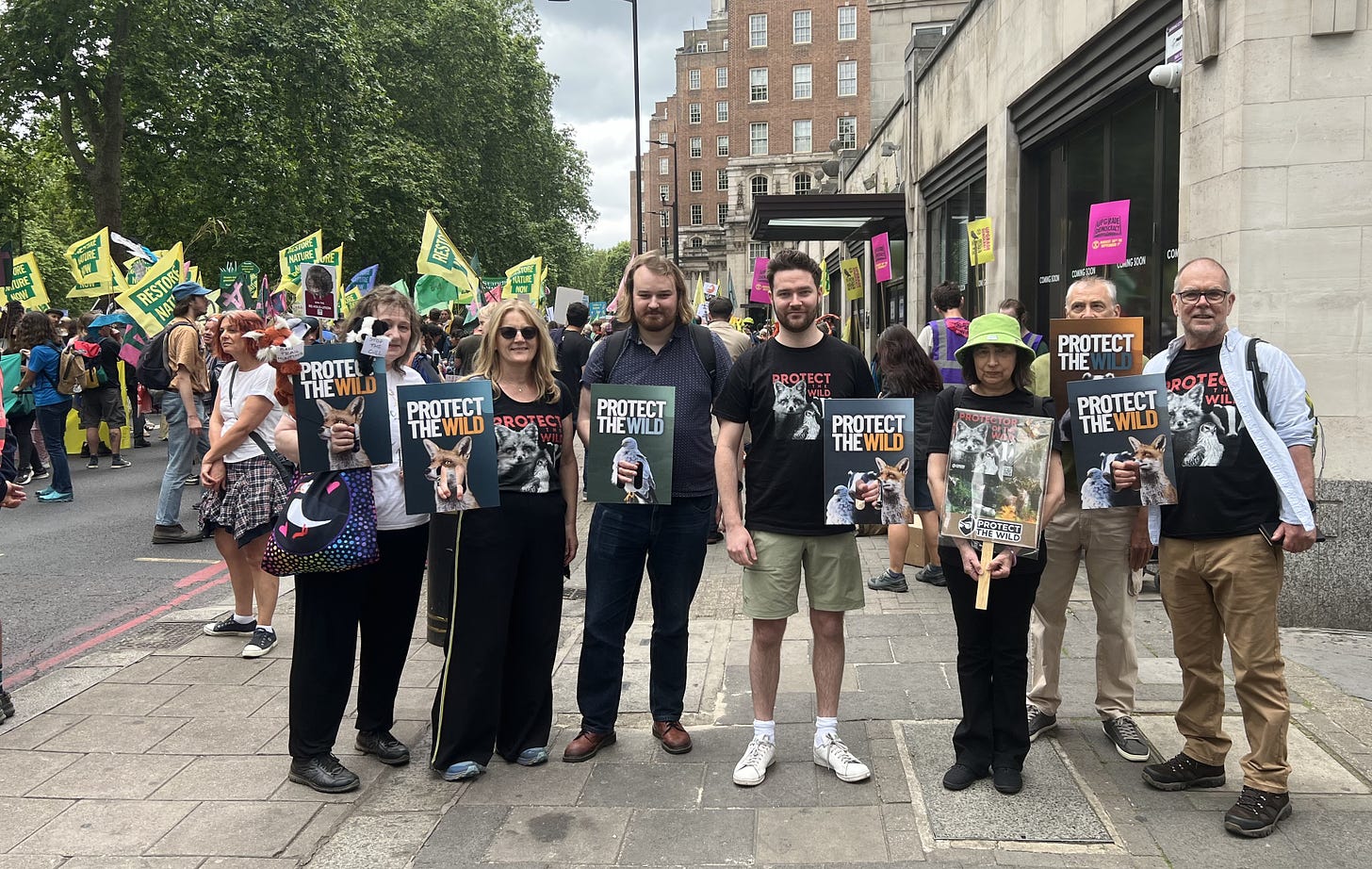
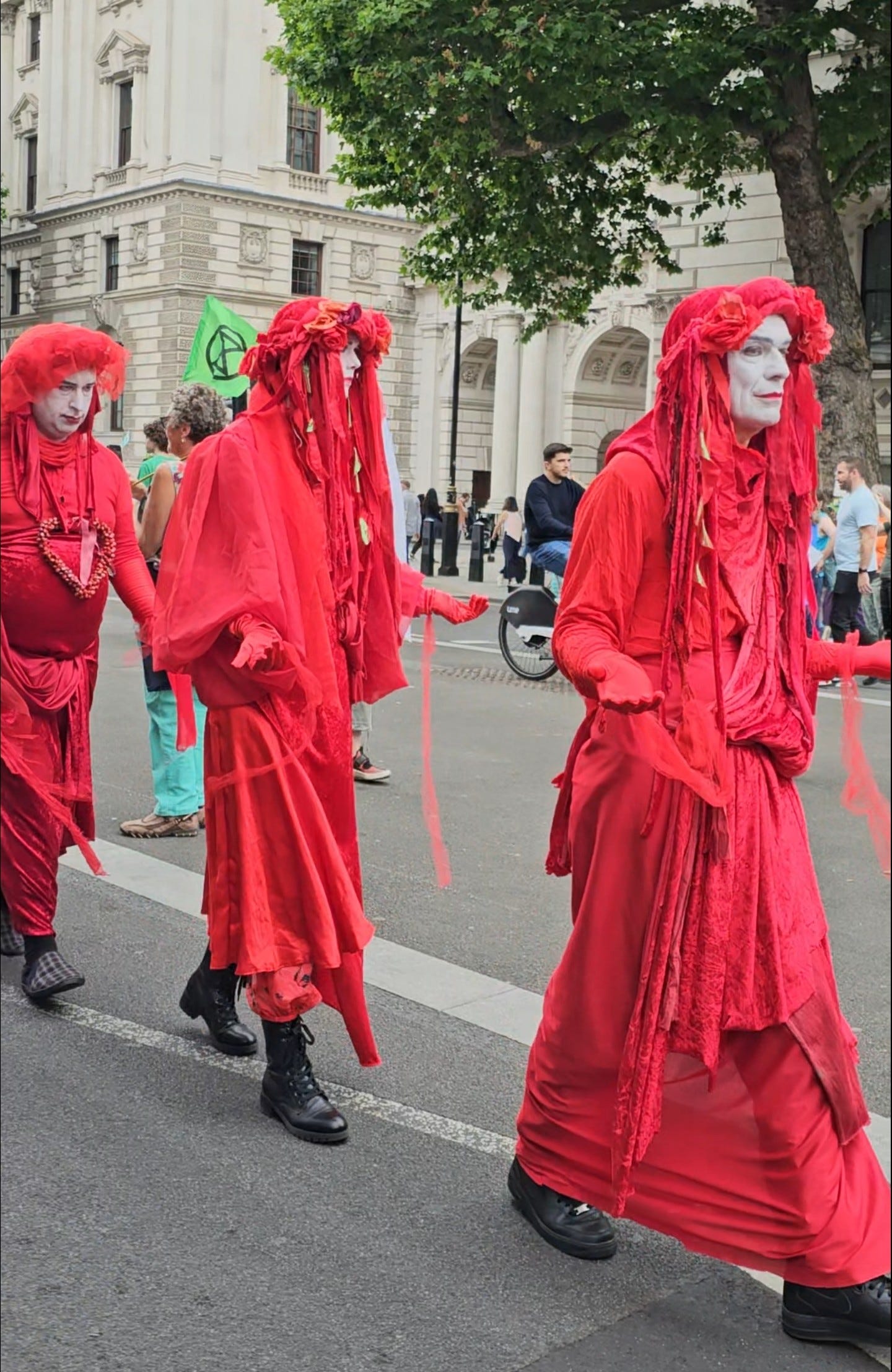
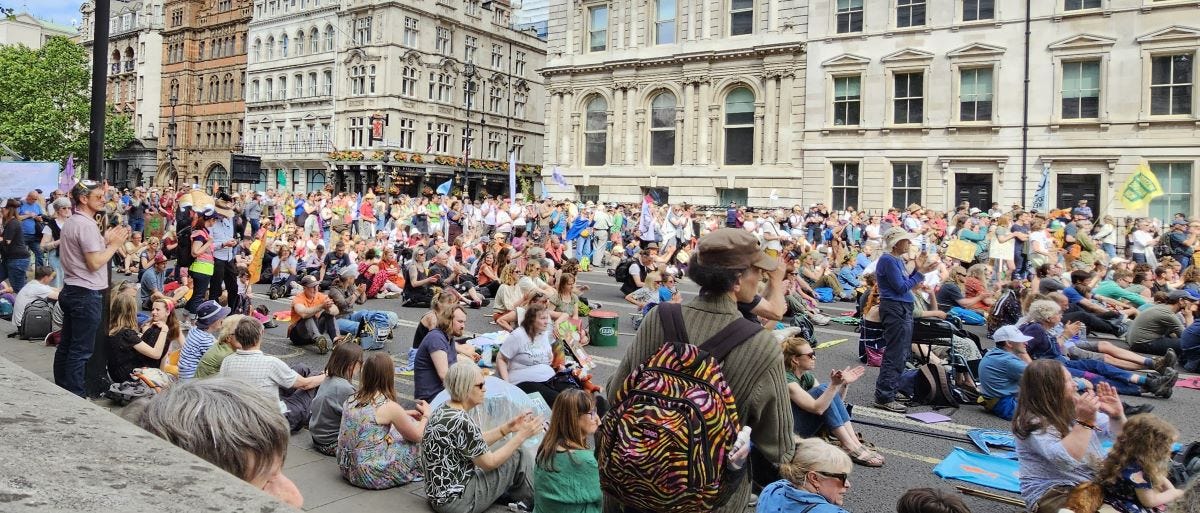
Sadly I wasn't able to attend in person (physically) but I watched and commented on the live feed on youtube. The likes of Steve Backshall, Emma Thompson, Feargal Sharkey, Amir Khan etc was amazing and to see so many charities and NGO's marching there together in unison too, even those who are almost "arch enemies" against each other (Born Free and Chester Zoo for example) but can put aside their differences for nature, was truly phenomenal!! The only thing I wished was mentioned more was the massive "elephant in the room" that no one seems to want to talk about: Human Overpopulation (although Steve Backshall did rightly touch on this briefly in his speech) and I wish the charity "Population Matters" could have been there as well. How many wild animal species can you number whose population comes anywhere near 8 billion, besides humans?The climate crisis has been caused by far too many humans wanting far too much/many resources that the Earth simply can't provide and humans thinking that they are the one and only so called "superior" (inferior) species whilst showing complete disrespect and arrogance towards any others that they deem to be of "lesser importance"!! Complete arrogance and selfishness in other words! Climate change is here and now and is causing thousands of deaths of innocent animals and people. I just sincerely hope that the next government properly takes this seriously for once but we can all do our bit to help animals, nature and the environment. Anything from choosing to not use pesticides, letting part of your garden grow wild, planting wildflowers, always recycling where possible, reducing our product consumption (how much you buy, use and throw away/recycle) and consumption of meat, fish and/or dairy, having a smaller family (having 1 or no children or adopting instead), installing solar panels, heat pumps, water butts, etc and so much more.
well done to all who attended the rally. The next government have a lot of work to do for climate we all need to be doing more for nature before we run out of time.